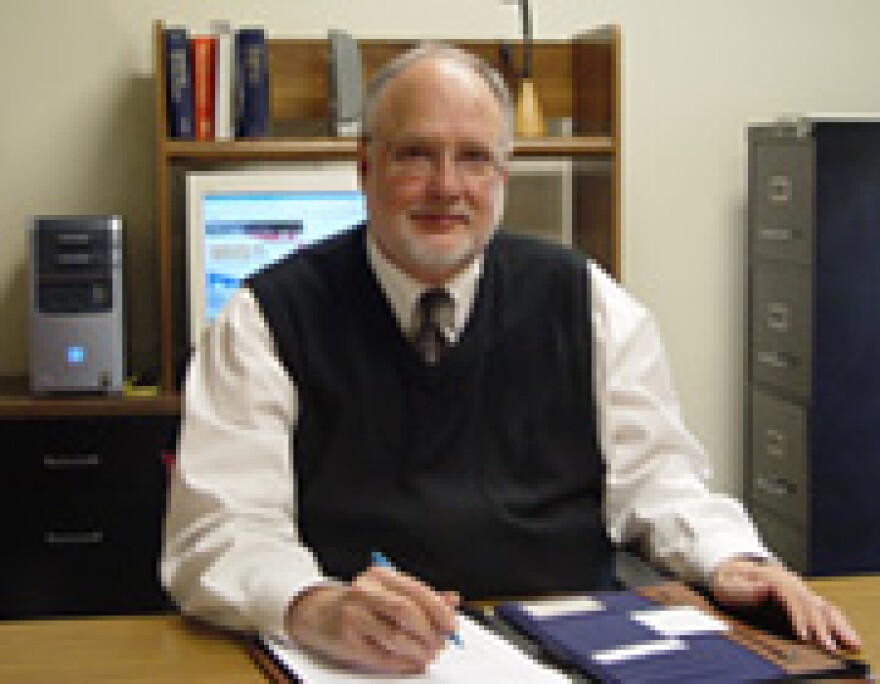Our editorial offices are in a flat-roofed, one-story building tucked away on the far east side of the campus of the University of Illinois at Springfield. Though one colleague described it as a “temporary 30-year-old structure,” it serves our needs just fine.
It also houses various other university departments, such as human resources, the campus ethics office, a survey research unit, the international students program, services for the disabled and a counseling center.
There also are three classrooms — as I found out soon after I began here. I shouted a greeting to a co-worker down a hallway and was met with a scowl and a slammed door by an instructor who was trying to teach a class.
Because our offices are surrounded mainly by support services, I had almost forgotten that the university’s primary purpose is to educate students. That was reinforced a couple of weeks later in an e-mail University of Illinois President B. Joseph White sent to administrators on all campuses. He described a planning process to “deliver maximum resources to the academic front lines” to ensure that the university supports its “core academic missions of teaching, research, service and economic development.”
White’s mission and my misstep turned my thinking toward what a tremendous influence teachers can have on our future.
Longer ago than I want to believe, I was a student at Indiana University trying to figure out what to do with my life. I had always been good in math and science, but in step with the naive zeitgeist of the early 1970s, I equated those fields with the “military-industrial complex,” and by extension, the Vietnam War. I yearned for something more — as the catchphrase of the day went — “relevant.”
I enrolled in a journalism news-writing class taught by Holly Arpan. A small, gravel-voiced taskmaster, she continually drilled us on precision and detail. I still recall one admonition that went something like, “Don’t call it a vehicle, call it a car, or better yet a Ford, or better yet, a Ford Mustang, or better yet, a blue Ford Mustang convertible.”
(She also taught obituary style by instructing us to write our own death notices as if we had been killed in a car wreck traveling home for Thanksgiving break. I can tell you, there were several dozen very cautious young drivers on Indiana’s highways that holiday weekend.)
One of my first offerings in her class wasn’t news — or even at all relevant. It was an essay on autumn. After grading the papers, she handed them back to the rest of the students, but I didn’t get mine. I figured I had totally botched it. But to my embarrassment, she read it aloud to my fellow aspiring wordsmiths and praised it for creativity and originality. I still have the essay, though looking at it now, her compliments were extremely kind.
But what an incredible feeling it is when someone you respect tells you you’re good at something. I knew at that moment what career I would pursue.
Of course, the opposite is also probably true. A teacher who makes a thoughtless negative comment risks driving a student away from the subject he or she is trying to convey.
Holly Arpan’s husband, Floyd, also taught journalism at the university. After completing Holly’s course, I gravitated to Floyd’s classes in magazine writing, and he was just as supportive and encouraging.
I always meant to thank them. I never did, and I don’t know whether either is still alive. I’ve also always toyed around with writing a magazine article, or even a book, about what or who steered successful people onto their original career paths. My guess is that many of them would point to a teacher. But I never did that, either. Maybe this column will salve some of that guilt.
In people’s minds, it seems as if perceptions about teachers have become wrapped together with all the ills of our public education system. Reports on 24-hour TV news channels focus on those who have abused their students. Employers complain that their new hires aren’t properly prepared for the jobs ahead of them. And many schools have a difficult time recruiting quality instructors because many college students choose more lucrative careers.
Teachers themselves complain that their creativity is sometimes stifled because No Child Left Behind legislation forces them to teach for tests, not for students’ enrichment. The hours are often long, the pay isn’t great and in today’s schools, the job sometimes can even be dangerous.
Granted, there are some teachers who are burned-out but still stand up in front of a class every day, simply going through the motions. But there still are some who can recognize a spark in a student and fan it until it grows into a full-blown flame. They and we need to remember that can happen, and when it does, it’s magical.
Now, when I tiptoe past a classroom on campus, I sometimes glance in and silently hope that amid all of the chaos that goes along with directing a class full of distracted students, the teacher still realizes he or she has the power to change someone’s life.
Please welcome another new member to the Illinois Issues staff. Tony Hamelin, our graduate assistant, joined us in March. He is pursuing a master’s degree in environmental studies at UIS, after graduating last year from Southern Illinois University at Carbondale.
Tony’s originally from Wisconsin, and along with his “green” environmental pursuits, he’s an avid Green Bay Packers football fan. That minor character flaw aside, he’s doing a great job checking our facts and policing our grammar and spelling.
Also, please look at page 7 to read about our new effort to encourage comments on the Illinois Issues Blog. As always, we value our readers’ opinions, and we’re confident the online discussions will remain thoughtful and civil.
Dana Heupel can be reached at heupel.dana@uis.edu.
Illinois Issues, February 2008





